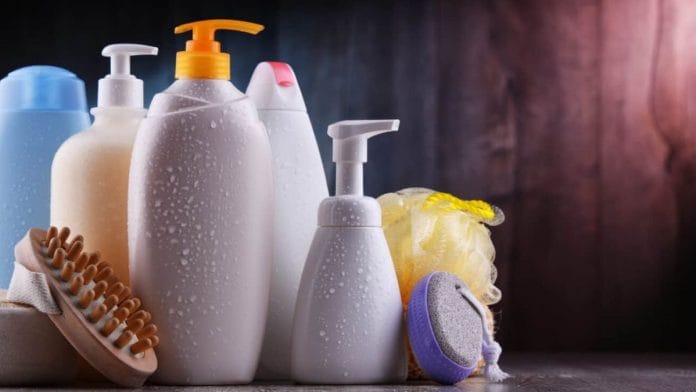Should you be using shower gel or soap? It’s a decades-old debate. With my 15+ years of experience in the business of skincare, I’m here to help you break down pH levels and what they mean, ingredients in shower gels and soaps that you need to be wary about, and some of my personal favourite tips for body care.
So, what is the difference between soap and shower gel, apart from the more obvious physical difference?
Soap has always been our go-to cleanser. It does the job, it’s cheaper, and an expert in dissolving oil and dirt from our skin. But I have come across brands that promise one thing but don’t quite deliver on it; not all soaps are created equal, and some can be quite harsh for your skin.
Shower gel, or liquid soap as it was called when it was invented in the 1800s, is often pushed as the more moisturising and hydrating of the two. It comes in more varied scents than soaps do (looking at all the vanilla-coconut scent enthusiasts out there).
Here’s something you should know: not all soaps are considered soaps. Some are called syndets—synthetic detergents. They’re gentler and their pH levels are closer to your skin’s natural level of 5.5.
Regular soap is more alkaline, which means it has a higher pH level, which, when used too often, can be a contributor to your skin’s natural moisture being stripped away; the Cruella of skincare, if you will.
So—soap or shower gel? Honestly, it depends on your skin type, your lifestyle, and your values. If you’re looking for gentle hydration and you share a bathroom with others, a low-pH shower gel might be your best bet. But if you want to cut down on packaging and stick to the basics, a good-quality soap can serve you just fine. What’s important is that you know your skin type.
Also read: Your makeup collection is a bacteria breeding ground. Here’s how to clean it
What is pH all about and why does it matter?
Potential Hydrogen, or pH, measures how alkaline or acidic any element can be. And just like with everything else, maintaining your skin’s pH levels is extremely important for a healthy, glowing complexion.
For your skin to be its best self, it needs to be slightly more acidic than neutral. This means that a healthy pH for your skin needs to be around 5.5 to help your skin protect and retain its moisture and natural barrier.
Now, in a scenario where your skin’s pH levels are normally slightly more acidic, here’s what you should know:
High pH soaps: This would constitute most of the traditional soaps out there. They can heavily irritate your skin’s barrier, leaving it dry and practically crying for help.
Low pH cleansers: Quite a few shower gels and syndets are milder on your skin and help it maintain its natural oils.
So, are shower gel and body wash the same thing?
Simply put, no.
These two products, while often thought of and spoken about interchangeably, are actually not the same.
While shower gel works for people with oily skin, body wash focuses more on hydration, and it’s perfect for people with dry skin or during the winter months when your skin is particularly thirsty for hydration.
A dermat’s tips
Cold showers are the best showers
Even if you want to continue with showering in hot water, I would suggest you splash at least 2 mugs of cold water on yourself after that. It helps to tighten your pores and boost blood circulation.
The DIY shower gel hack
If you want to take a break from soaps and shower gels, and body washes, then here’s one of my favourite shower gel hacks: Mix sandalwood powder and multani mitti (fuller’s earth) powder into a smooth paste and use that to wash your body. If you have dry skin, add a little parboiled milk OR aloe vera to this mix, and it’s like a sure-shot hydration boost.
Bacteria alert
If you share your soap with other people, then beware of bacteria. Shared soap can gather germs. So always rinse a shared soap well and let it dry before using it anywhere on your body.
The when and the what
Shower gel needs to be your go-to in summers or if you have oily skin. If you have dry skin, which becomes flaky during the winter, you should use body wash. Hyaluronic acid and ceramides in body washes help add additional moisture to your skin.
Soap isn’t the evil that it’s made out to be. For the environmentally conscious, it’s often the better option—less packaging, fewer microplastics, and usually made with simpler, biodegradable ingredients.
It really matters what ingredients are in your soap, shower gel, and body wash.
What I recommend:
- Glycerin
- Ceramides & hyaluronic acid
- Natural oils like coconut and almond
Watch out for parabens, phthalates, and microbeads—they can do serious damage to your skin. And just because a bath product smells delicious, doesn’t mean it’s good for you.
Dr Deepali Bhardwaj is a Consultant Dermatologist, Max Hospital, Saket. She is also an anti-allergy specialist, laser surgeon and internationally trained aesthetician. She tweets @dermatdoc. Views are personal.
(Edited by Ratan Priya)






